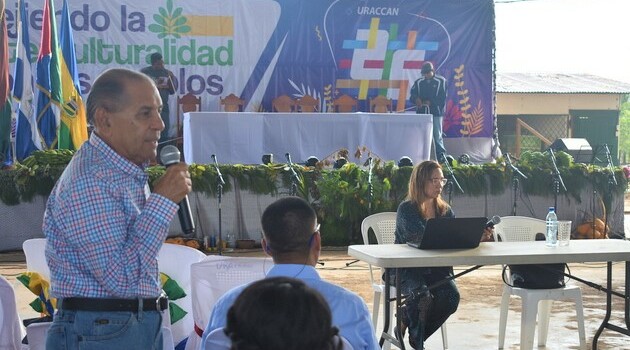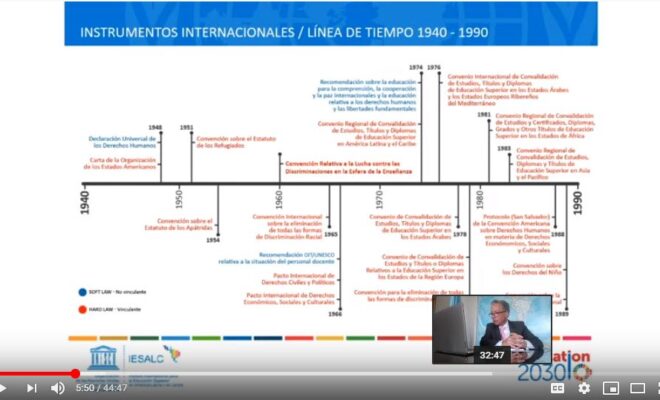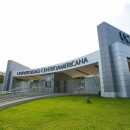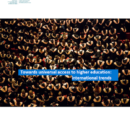Monitoring the CRES 2018-2028 Action Plan in IESALC’s Working Program

“The Latin American and Caribbean region lacks a critical mass of human capital for research, with a rate of 1.35 researchers for every one thousand members of the economically active population”, stated the UNESCO International Institute for Higher Education in Latin America and the Caribbean (UNESCO-IESALC). These figures, extracted from the study on academic mobility in the region carried out by the Institute, show that the number of academics who hold a doctorate is low: Honduras (0,1%), El Salvador (2,3%), Costa Rica (3,4%), Dominican Republic (3,5%), Ecuador (5,6%), Cuba (6,5), Colombia (7,1%), and Peru (7,9%), with the exception of Brazil (41,9%) and Chile (10,9%).
This data was made known during the presentation of “Desafíos de la educación superior en América Latina y el Caribe en perspectiva del programa de trabajo del IESALC 2020-2021: continuidad y ampliación de horizontes para la acción” (Challenges of Higher Education in Latin America and the Caribbean in the perspective of the IESALC 2020-2021 working program: continuity and broadening of horizons for action), delivered by Debora Ramos, IESALC academic specialist, within the framework of the XXV Anniversary of the Universidad de las Regiones Autónomas de la Costa Caribe Nicaragüense-URACCAN (University of the Autonomous Regions of the Caribbean Coast of Nicaragua), on October 30,2019.
“Between 2012 and 2017, the percentage of students in the region grew 16%, going from 24 million students in 2012 to 27 million in 2017. This accelerated growth in the region allows boosting opportunities for its development and also for international mobility, offering its actors, managers and decision-makers several challenges”, stated Ramos. Also, for the same period, the increase in the number of HE students mobilized in LAC registered a growth that went from 1,09% to 1,14%, compared to students at international levels which went from 2,05% to 2,3%.
Along with the expansion and growth of higher education in the region, the figures show limited doctoral training of the academic personnel, and highlight the importance of incorporating new technologies to higher education. They also evidence challenges that still have to be met in Latin America and the Caribbean, such as those concerning equity, inclusion, quality, relevance, recognition of degrees and studies, and innovation. “The IESALC constitutes them into four priorities for the two-year period 2020-2021 which, along with the implementation of strategies, will allow monitoring the 2018-2028 Action Plan derived from the III Regional Conference on Higher Education (CRES 2018), that has 33 objectives, 66 goals, 166 indicative strategies and 103 recommendations of the region for the higher education actors”, said Ramos.
The IESALC website states that in light of the 2015 Global Forum on Education, the May, 2015 Incheon Declaration, the United Nations’ September 2015 Sustainable Development Goals (SDG), and the SDG 4 of UNESCO’s 2030 Education Agenda on December 2015, the CRES 2018-2028 Action Plan presented three views that define higher education: main motor for human development (peace, eradication of poverty, sustainable development and inter-cultural dialogue); the challenge of transformation and democratic advancement (social inequities, institutional crisis, new political actors in face of society); and strategic social assets (plurality, autonomy, quality, inclusion and cultural diversity).
At the end of the presentation, which took place at Bilwi, Nicaragua, the IESALC presented strategies for each one of its priorities and, as a UNESCO Institute, defined its transversal challenge: “Guarantee that its principles and guidelines be carried out in a coordinated way by all the actors, a task to which the IESALC will decidedly contribute to, from its position as regional and international referent”.
Some figures of interest:
52% of the region’s higher education enrollment tends to be concentrated in 7 of the 33 countries that constitute it.
The LAC geographic space counts with 60 thousand programs and 13 thousand institutions of higher education.
22% of higher education in LAC is at distance or virtual.
The increase of the enrollment in the last 30 years lies fundamentally on the private sector and on the technologies area.
Picture courtesy of URACCAN.
RELATED ITEMS








